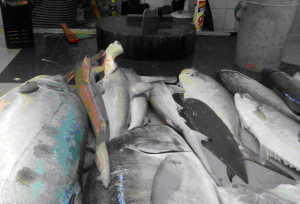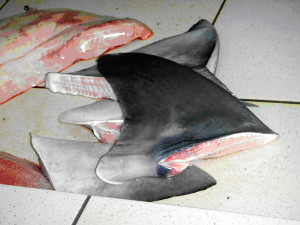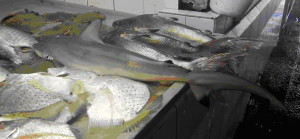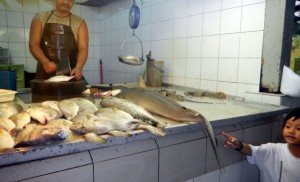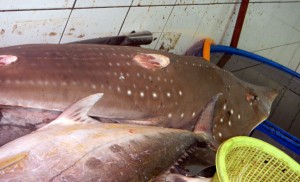Marine Life & Conservation
Recent updates about the Shark situation in South East Asia

As we all know an approximate number of 100 million sharks are killed every year to support the demand for shark fin soup, mainly from countries in South East Asia.
In China the growing middle class are craving to eat this dish which was classified as a traditional wedding treat and served at state banquets; however, many Chinese hotels like Shangri-La has recently banned the soup from their regular menu and many other high class restaurants in the neighboring countries are following suit.
BAD NEWS
Last week terrible news came from one of Hong Kong´s conservationists groups – a whale shark factory was found that processed over 600 Whale Sharks annually. These giant animals are hunted not only because of their valuable fins but also for their liver. A shark liver can be a third of the size of a sharks body and the oil is an essential ingredient in the preparation of cosmetics like lipsticks and creams.
Alex Hofford and Paul Hilton of WildLifeRisk, the conservationists group that discovered the factory, said:
“How these harmless creatures, these gentle giants of the deep, can be slaughtered on such an industrial scale is beyond belief, and all for human vanity; lipsticks, face creams, health supplements, shark fin soup restaurants. We firmly believe the trade must stop, and it must stop now, or else these animals will eventually face extinction.”
When resources run scarce, old battles resurface; China is again debating with surrounding countries like the Philippines, Vietnam, Taiwan, Malaysia and Brunei over South China Sea fishing rights.
China has imposed a new law that bans foreign vessels in “Beijing claimed areas” and the Philippines has said this is illegal and a serious threat to the peace in the area, since China claims almost the entire South China Sea as their own. The Philippines has tried to arbitrate under the UNCLOS (United Nations Convention on the Law of Sea) to make Chinas claim illegal.
Chinese official sources said “the fisheries conservation regulations had been issued and published by China since the 1980s. There was no reaction from the Philippines then and yet these are the very same rules that are being attacked today.”
To be continued….
In other areas in the Philippines, Marine Biologists are criticizing fisherman over their new method of making money; they are “hand feeding” whale sharks in order to attract tourists.
This practice has become highly popular, and since sightings of these giants is practically guaranteed, the fishermen can earn a lot more money and spend less time working too.
The Marine biologists claim this practice disturbs the whale shark’s natural behavior and increases disease and parasites, and they are conducting a study to observe the change over time.
These kind of stories where conservation only takes place when there is a demand or monetary interest will unfortunately become more common in the future.
But isn’t it better to have the whale shark hand fed than in whale shark fin soup?
GOOD NEWS
Indonesia has created the country’s first shark and manta ray sanctuary. Created at the beginning of 2013 and based in Raja Ampat, it’s the first in the Coral Triangle. 6 months later, Komodo with it´s 7,000 sq km has also joined other areas of Indonesia to protect its sharks and rays.
Indonesia is an important country because it’s one of the world’s biggest fisher and exporter of sharks, so the sanctuaries are extremely vital for the area and a good sign of a will to save wildlife for tourism (as sharks and rays bring in more for money alive then dead).
The Sultanate of Brunei has become the first Asian country to ban shark finning, effective from January 2014. Routine checks on establishments will be conducted to ensure the ban is followed.
The Sultan Hassanai Bolkiah Mu’izzaddin Waddaulah has banned the catch and landing of all shark species from the waters of Brunei Darussalam, as well as shark fin sales in the domestic market, and the importation and trade of shark products.
This is a law that has not even been achieved in countries like the United States, so for an Asian country this is very progressive.
Shark meat used to be sold at the market at very cheap prices, only the fins are more expensive and most of the times already sold before reaching the market.
Photos taken before the implementation of the law for shark Finnning, Fish market, Jerudong , Brunei Darussalam in December 2013.
Neighboring areas to Brunei like Northern Sabah are trying to follow the steps of Brunei, but the Southern region of Sarawak is far from acknowledging this law. The general manager of the Protected Areas and Biodiversity Conservation Division Oswald Braken Tisen said recently:
“Not all sharks are protected species, and selling of shark’s fin and consuming it is still not against the law.”
The Shark experts’ opinions are unanimous: “Laws to restrict trade will mean little unless there are total bans on fishing.”
After checking up on how the new law about shark protection is affecting the fish market in Jerudong in Brunei Darussalam, I attach these two pictures from the 6th of February.
Sharks are still openly displayed on the counter, some still with their fins, and some guitar fish without fins. I have tried to reach the Ministry´s fisheries for a comment but they are still busy with Chinese New Year celebration and are proving difficult to reach.
I’ll try again next week….
Marine Life & Conservation
Shark Trust launches Oceanic 31 Shark Art Auction

 After a two-year tour of UK art galleries, community spaces and aquariums, the Shark Trust’s acclaimed Oceanic31 exhibition takes its final bow at the Royal Geographical Society later this month. And the unique collection of artwork, depicting 31 species of oceanic sharks and rays, donated by 31 artists, is now open for bids from art lovers and shark enthusiasts. The online auction, launched today, will close on the 7th December at 8pm (BST). The money raised will support the Shark Trust Oceanics Programme.
After a two-year tour of UK art galleries, community spaces and aquariums, the Shark Trust’s acclaimed Oceanic31 exhibition takes its final bow at the Royal Geographical Society later this month. And the unique collection of artwork, depicting 31 species of oceanic sharks and rays, donated by 31 artists, is now open for bids from art lovers and shark enthusiasts. The online auction, launched today, will close on the 7th December at 8pm (BST). The money raised will support the Shark Trust Oceanics Programme.
People can now bid on 27 of the artworks by visiting this website:
https://superstars-auctions.com/sharktrustauction
It is a chance to own a beautiful piece of original art and to support the Shark Trust. The timing of the auction also means that these would make a very special Christmas gift for any shark-lover.
- Bigeye Thresher Shark by Janina Rossiter
- Carcharodon carcharias by Jimmy Higgs
- Croc VR 2030 by Tom Mead
- Oceanic Whitetip by ATM
- Silky Street by ScapaJoe
The diversity of pieces mirrors that of the sharks and rays they represent. You can bid on paintings, digital creations, sculptures, mixed media and more. You can pick your favourite artist or species of shark. Or you can select the perfect artwork to make a statement in your home or office. Whichever you choose, you will be supporting the work to protect these amazing animals.
One of the pieces of art has been selected to be auctioned live by Steve Backshall at the For the Love of Sharks event at the Royal Geographical Society in London on the 29th November. In addition to this, two further pieces will be raffled at this event, giving people a chance to win an incredible piece of shark art. For the Love of Sharks is the Shark Trust’s flagship evening. A night to celebrate sharks. Steve Backshall is the headline speaker at this event that will see other prominent shark advocates join him on stage.
Tickets for the event can be snapped up here:
https://thesharktrust.org.uk/Event/flos24
Those that would like to see the Oceanic 31 exhibition have one final chance. It is being displayed at the Pavilion at the Royal Geographic Society from 26th November until the 7th December. Entry is free.
Find out more here:
https://www.rgs.org/events/upcoming-events/oceanic-31
Paul Cox, Shark Trust CEO, Said “This exhibition has given us the opportunity to reach out to a new audience. And inspire more people with the wonderful sharks and rays on which our Big Shark Pledge campaign is based. We are immensely grateful to the 31 artists who have worked so hard to create these works.”
Bid for your favourite Oceanic 31 artwork here:
https://superstars-auctions.com/sharktrustauction
Banner Image: Smooth Hammerhead by Alicia Hayden
Marine Life & Conservation
Meet Steve Backshall in the Bite-Back Prize Draw

Until 28 November, prizes worth a massive £10,000 – including experiences, products and tuition – feature in a line-up of items that can be won for £5 in an online prize draw to celebrate Bite-Back Shark & Marine Conservation’s 20th anniversary and help generate crucial funds for the future.
Top of the list of prizes is the chance to spend time with adventurer and wildlife expert Steve Backshall, a workout session with Nat Geo star Aldo Kane, a kayaking trip alongside white-water expert and diver Sal Montgomery and a Zoom call with ‘shark whisperer’ Cristina Zenato.
On top of that, some of the most admired companies in the diving and scuba industry have been quick to support the charity with fabulous prizes that make the £5 ticket price worth more than just a flutter.
Master Liveaboards, BSAC, Midlands Diving Chamber, Go Freediving and Blue Shark Snorkel have all generously donated experience prizes, while celebrated photographer Alex Mustard has donated a print and artists Scott Gleed and Olivier Leger have donated a sculpture and illustration to help boost the fundraising pot.
Fourth Element has donated Ocean Positive gear and LA watch company Nodus has gifted the charity a stunning dive watch. For land lovers, the charity has included a five star London hotel stay at Bankside Hotel plus a family visit to Longleat Safari Park in the roster of prizes.
Campaign director for Bite-Back, Graham Buckingham, said: “We’ve been overwhelmed with support from companies and individuals that we truly admire and who have supported us on our 20 year journey and we’re truly grateful to them all. While we feel incredibly proud of our achievements over the past two decades – and we are super excited about the next chapter – this prize draw isn’t a vanity project. It represents a real lifeline to our work and important advancements in the global protection of sharks. So we hope divers, dive clubs and even bargain hunters grab some tickets to make this a massive success.”
The charity hopes that the prize draw will generate crucial funds to launch a brand new, ground-breaking, campaign to enrol the public and increase support for the protection of sharks around the world.
To enter the competition visit www.bite-back.com/prizedraw. The prize winners will be announced on 1 December 2024.
-

 News1 month ago
News1 month agoIconic SS United States to become the World’s Largest Artificial Reef
-

 Blogs3 months ago
Blogs3 months agoNovoScuba’s Game-Changing Approach for Dive Store Owners: WE PAY YOU!
-

 News2 months ago
News2 months agoBook Review – 52 Assignments: Underwater Photography
-

 Gear News2 months ago
Gear News2 months agoDYNAMICNORD – New German diving brand enters the British market
-

 News2 months ago
News2 months agoExploring Cenote El Pit: A Diver’s Dream
-

 Gear News2 months ago
Gear News2 months agoTry BARE drysuits (and maybe even win one!) this Friday with Sea & Sea at North West Dive Fest
-

 News3 months ago
News3 months agoComing Soon – 52 Assignments
-

 News3 months ago
News3 months agoSave £200 per person per week at Pole Pole Lodge with Dive Worldwide


